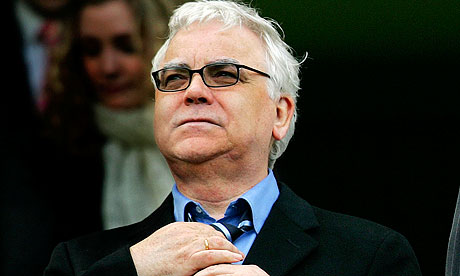Everton would have made a £22m loss, rather than the £3.1m they recorded, had they not cleared £19m from selling players including Joleon Lescott to Manchester City, their accounts have revealed.
Although the chief executive has dismissed reservations among some fans about Everton's financial position, the figures for the year ending 31 May, 2010, a season in which they finished a disappointing eighth, illustrate how difficult it has become for a club of their financial resources – still at Goodison Park following the refusal of planning permission for the proposed new stadium in Kirkby – to compete in the Premier League.
Everton's turnover, £79m, was £10m short of that of Aston Villa, who were Europe's 20th highest-earning club last year, according to Deloitte's football money league. A club's income, and wages paid to players, correlates almost exactly to performance on the pitch; the seven English clubs in the top 20 are the ones which finished above Everton. Manchester United, whom Deloitte estimate turned over £286m, made more than three times Everton's revenue.
Income and profitability do not amount to the same thing, however, and City, up to 11th with £125m income, also made a huge loss, £121m, from player signings and a £133m wage bill – more than double Everton's – bankrolled by Sheikh Mansour.
One of those players was Lescott, whom City signed for £22m, the top‑priced highlight of transfer dealings on which Everton recorded an overall profit of £19m. Everton's operating expenses, including £17m for the "amortisation" – writing down – of the fees current players were signed for, amounted to almost £97m. There was also £4m interest paid on £48m borrowings.
Robert Elstone, the chief executive, and the club's chairman, Bill Kenwright, said they would keep investing to compete against the clubs with vastly greater income. That includes Liverpool, who turned over £185m, more than twice Everton's income. With John Henry hinting Liverpool will stay at Anfield, the faint idea of the two sharing a stadium is fading.
Everton have no plans for a new stadium, and a £9m administration block is being built at Goodison by the catering and merchandising partners, which should generate more income. With Goodison, loved as it is, considered outdated and unable to make the money generated by some clubs, Everton are not likely to be bought by a Mansour any time soon.
Kenwright, though, continues to hope for deliverance. "I shall continue to work tirelessly for the cause," he said in the annual report.{jcomments on}
 HABERLER & MAKALELER
HABERLER & MAKALELER 


































